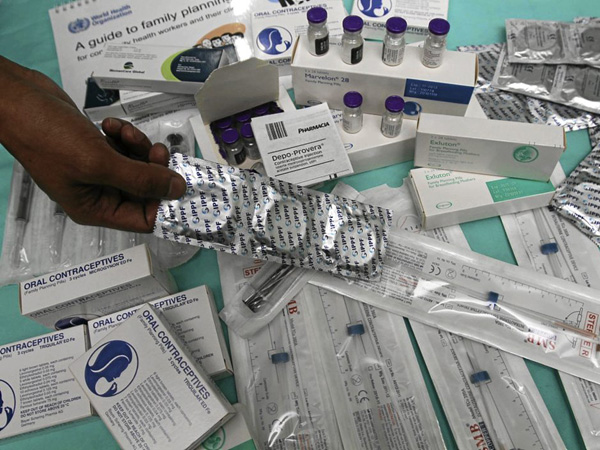Facts about contraceptives

Thandeka Moyo, Health Matters
One of the most stressful decisions that every sexually active woman has to make is to choose a contraceptive method with the least side effects.
Some women have battled with excessive weight gain as a result of using contraceptives while others complain of amenorrhea, which is simply an absence of a period.
Sadly, many women have misconceptions about contraceptives and often make ill informed decisions with regards to which one best suits their bodies.
For a long time, contraceptives were foreign to many people in Zimbabwe with some claiming they are a tool of reducing the population of blacks.
I caught up with officials from the Zimbabwe National Family Planning Council (ZNFPC) and United Nations Population Fund who shared simple facts about contraceptives.
Firstly, the aim of contraceptives is to improve the health and wellbeing of all women users.
They are meant to prevent unwanted pregnancies and abortions related to unwanted pregnancies. Contraceptives were also introduced to reduce morbidity and mortality- most women die as a result of birth complications.
One thing they emphasised was that the total risks of birth control are much less than the total risks of an unwanted pregnancy!
There are three types of family planning methods which are hormonal, barrier and intrauterine device methods.
Hormonal methods include oral contraceptives which are injectables (Petogen /Depo-Provera) and implants (Norplant I and II and Jadelle). For those who love definitions, a pill is a short acting hormonal contraceptive taken by a woman daily by mouth to prevent pregnancy. It works mainly by preventing maturation or ripening of the egg.
Contraceptive pills help stop ovulation, thicken cervical mucus and make the uterine lining thinner.
All women of reproductive age who wish to use family planning, including those who are HIV positive can use the pill. Breastfeeding women and the nulliparous (those who have never given birth) can also use the pill.
ZNFPC says the pill is not safe for women with undiagnosed abnormal uterine bleeding, current cancers of the reproductive system, pregnant and those with a current history of thrombo embolism.
Pills come with benefits as they prevent pregnancy (obviously), ease menstrual cramps, shorten and regulate periods (menses), decrease the incidence of ovarian cysts, decrease acne and prevent ovarian and uterine cancer.
Women on the pill can watch out for the following side effects: breast tenderness, nausea, headaches, mood changes, weight changes and spotting.
ZNFPC encourages women to take the pill on the first day of the cycle, at the same time each day and never to overdose when they miss a day or so. They would rather take the pill as soon as they remember and use a barrier method like condoms.
When taken daily at the same time, the pill is 99 to 100 percent effective.
Lastly, the pill, just like many contraceptives offers no protection from Sexually Transmitted Infections (STIs).
Currently, Zimbabwean women can access the Progestogen only pill (POP).
Injectable hormonal contraceptive methods, which are injected into a woman by a trained service provider to prevent pregnancy, are quite common in Zimbabwe
Injectables do not interfere with sex and do not affect the quantity and quality of breast milk and can be used safely by breast feeding women six weeks after delivery.
Side effects that come with using injectables are weight gain, irregular bleeding in the first few months and these are not harmful.
Some women may also experience amenorrhea usually in the first year of use.
Implants are small contraceptive plastic rods with the hormone that is slowly released into the woman’s upper inner arm by a trained health service provider.
They are highly effective and a long acting reversible contraceptive which can be used by the majority of women.
Jadelle, the first type of implants is a two rod implant effective in preventing pregnancy for up to five years. The implanon is a single rod implant effective in preventing pregnancy for up to three years.
A lot of myths and misconceptions surround the use of implants and some go as far as assuming that Jadelle causes cancer.
In fact, ZNFPC says Jadelle may help prevent endometrial cancer and it does not migrate in the body unless removed.
Jadelle, as some believe, does not lead to pregnancy in HIV patients taking antiretroviral drugs.
Just like the pill, implants do not prevent STIs, HIV and Aids hence they should be used with condoms.
Irregular menstrual bleeding and spotting for three to six months, amenorrhea, weight changes, mood changes and a decreased libido can be expected from women who use implants.
Experts say not every woman experiences side-effects. With implants, return to fertility is immediate as a woman may have it removed when she wishes.
Injectables do not cause infertility, abortions or deformities in babies.
Emergency contraception popularly known as the morning after pill can reduce the chance of a pregnancy by 75 percent if taken within 120 hours of unprotected sex.
It works by flooding the ovaries with a high amount of hormones and prevents ovulation, alters the endometrium of the uterus, making it unfavourable for fertilisation.
And then we also have barrier methods which prevent pregnancy by blocking the ovum and sperm.
Barrier methods, however, have higher failure rates than hormonal methods due to design and human error.
The male condom which also offers protection from STIs has a perfect effectiveness rate of 97 percent.
Combining condoms with spermicides raises effectiveness levels to 99 percent, according to ZNFPC.
The female condom, which was made as an alternative to male condoms is physically inserted into the vagina.
Spermicides are chemicals which kill or immobilise sperms in the vagina and are only 76 percent effective if used alone.
Women also have an option of using IUCDs, a plastic device placed in the uterus to prevent pregnancy. These can last for up to 10 to 12 years.
Side effects include minor abdominal cramps three to four days after insertion which can be relieved by analgesia. Moderate to heavy menstrual bleeding can be experienced a few months after insertion.
These have no hormonal side effects and can be used by any woman having hormonal problems even hypertensives.
Honestly, I didn’t get enough information on permanent methods such as vasectomy due to the fact that Zimbabwean men have clearly “protested” against the method.
Tubal ligation where fallopian tubes are cut, tied, cauterised thereby blocking movement of ova is also another permanent option for females.
Natural family planning methods like cervical mucus method and billings ovulation method are also effective in preventing pregnancies.
I could go on and discuss the methods in detail but allow me to leave it here. To our adolescents, remember the availability of all these methods is not a passport to indulge in premature sex. Statistics show that engaging in early sex can be catastrophic to young women.
One disadvantage is that it actually increases on their chances of getting cervical cancer. Until next week, let’s do all we can to stay healthy!
*Remember to leave a comment via email [email protected] or Twitter handle @thamamoe.











Comments